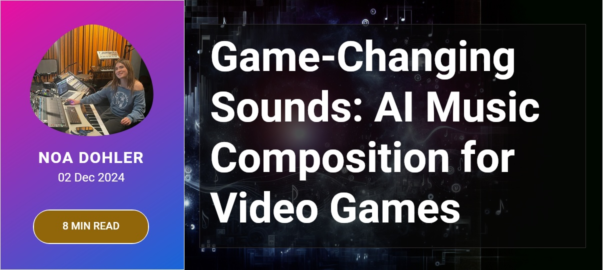AI Music Tech transforms video games into living soundscapes.
The gaming industry is witnessing a revolutionary shift in how soundtracks are created and experienced. Just as AI is reshaping music in films and video games, adaptive algorithms are now crafting dynamic soundscapes that respond to player actions, creating unprecedented levels of immersion.
As a composer, I recently experimented with AI-assisted game scoring, and was amazed when the system anticipated emotional cues before I could write them. It felt like having a musical mind reader as a collaborator, though I had to laugh when it tried to turn my boss battle theme into a lullaby!
Dynamic Soundscapes: The Evolution of Game Audio
Modern video game soundtracks have evolved far beyond simple background music. AI Music Tech is revolutionizing how developers approach sound design, creating responsive audio environments that adapt in real-time to player actions and game states. These systems analyze gameplay data, environmental factors, and player behavior to generate contextually appropriate music and sound effects.
Personalized Audio Experiences Through Machine Learning
AI algorithms are now capable of learning individual player preferences and adapting the musical experience accordingly. The technology processes vast amounts of data about player behavior, emotional responses, and gaming patterns to create uniquely tailored soundtracks. This personalization extends to existing music catalogs, allowing games to remix and adapt licensed tracks in real-time.
Real-time Composition and Emotional Resonance
The latest AI Music Tech developments enable instantaneous composition that responds to player emotions and actions. These systems can generate complex musical arrangements that seamlessly transition between different emotional states, intensifying during action sequences and softening during exploration. The technology analyzes facial expressions, heart rate, and other biometric data to create music that resonates with the player’s emotional state.
The Future of Interactive Game Audio
As AI Music Tech continues to advance, we’re seeing the emergence of more sophisticated audio systems that can generate complete orchestral scores in real-time. These systems are beginning to understand narrative context and can create musical themes that evolve with character development and story progression. The integration of AI in indie game development is particularly promising, democratizing access to high-quality adaptive music.
Innovation Opportunities in Gaming Audio
Companies could develop AI-powered music subscription services specifically for game developers, offering customizable soundtracks that adapt to different game genres and moods. Start-ups might create marketplace platforms where AI-generated game music can be bought, sold, and licensed. There’s also potential for developing AI tools that allow players to become co-creators of their game’s soundtrack, personalizing the musical experience through voice commands or gesture controls.
Shape the Future of Gaming Audio
The convergence of AI and music technology in gaming is opening new frontiers in interactive entertainment. Whether you’re a developer, composer, or gaming enthusiast, now is the time to explore these innovative tools and shape the future of game audio. What kind of musical experiences would you create with AI? Share your thoughts and join the conversation about the future of game soundtracks.
FAQ about AI Music Tech in Gaming
Q: How does AI create music for video games?
A: AI analyzes gameplay data and player actions to generate adaptive music in real-time, using machine learning algorithms to compose appropriate soundtracks for different situations.
Q: Can AI-generated game music be copyrighted?
A: Yes, AI-generated music can be copyrighted, though the legal framework is still evolving. Currently, copyright usually belongs to the human creators who trained and used the AI.
Q: Do AI music systems replace human composers?
A: No, AI music systems typically complement human composers, providing tools for creating adaptive soundtracks while maintaining human creative direction and emotional depth.
